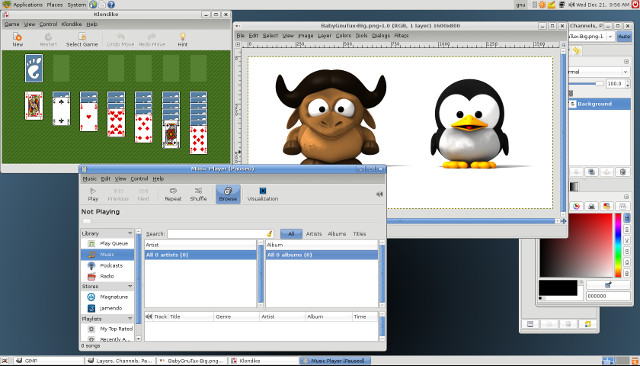GNU is the only operating system developed specifically to give its users freedom. What is GNU, and what freedom is at stake?
What is GNU?
GNU is an operating system that is free software—that is, it respects users' freedom. The development of GNU made it possible to use a computer without software that would trample your freedom.
We recommend installable versions of GNU (more precisely, GNU/Linux distributions) which are entirely free software. More about GNU below.
What is the Free Software Movement?
The free software movement campaigns to win for the users of computing the freedom that comes from free software. Free software puts its users in control of their own computing. Non-free software puts its users under the power of the software's developer. See the video explanation.
What is Free Software?
Free software means the users have the freedom to run, copy, distribute, study, change and improve the software.
Free software is a matter of liberty, not price. To understand the concept, you should think of “free” as in “free speech”, not as in “free beer”.
More precisely, free software means users of a program have the four essential freedoms:
- The freedom to run the program as you wish, for any purpose (freedom 0).
- The freedom to study how the program works, and adapt it to your needs (freedom 1). Access to the source code is a precondition for this.
- The freedom to redistribute copies so you can help your neighbor (freedom 2).
- The freedom to improve the program, and release your improvements to the public, so that the whole community benefits (freedom 3). Access to the source code is a precondition for this.
Developments in technology and network use have made these freedoms even more important now than they were in 1983.
Nowadays the free software movement goes far beyond developing the GNU system. See the Free Software Foundation's web site for more about what we do, and a list of ways you can help.
More about GNU
GNU is a Unix-like operating system. That means it is a collection of many programs: applications, libraries, developer tools, even games. The development of GNU, started in January 1984, is known as the GNU Project. Many of the programs in GNU are released under the auspices of the GNU Project; those we call GNU packages.
The name “GNU” is a recursive acronym for “GNU's Not Unix.” “GNU” is pronounced g'noo, as one syllable, like saying “grew” but replacing the r with n.
The program in a Unix-like system that allocates machine resources and talks to the hardware is called the “kernel”. GNU is typically used with a kernel called Linux. This combination is the GNU/Linux operating system. GNU/Linux is used by millions, though many call it “Linux” by mistake.
GNU's own kernel, The Hurd, was started in 1990 (before Linux was started). Volunteers continue developing the Hurd because it is an interesting technical project.

Planet GNU

Who in the world is changing it through free software? Nominate them today!: Nominations for the 19th annual Free Software Awards opened at LibrePlanet 2016, right after the most recent Free S... more
Version 2.0.14 is imminent, please test: Binary builds for testing are labelled 0.0.0 at http://www.denemo.org/~jjbenham/gub/uploads/?C=M;O=D new features at http://www.denemo.org/roadmap/#Rel... more
guile-curl v0.4 released: I am pleased to announce an small update of guile-curl, which is a library for fetching files by URL from the internet in the GNU Guile dialect of the Scheme programm... more
For more news, see Planet GNU and the list of recent GNU releases.
Take Action
- Support current FSF campaigns.
- Defend privacy, and support global copyright reform with LQDN.
- Support the efforts on net neutrality in Europe, in the USA and in Canada.
- Fight against software patents: worldwide, and Europe.
- Can you contribute to any of these High Priority Projects? Gnash, coreboot, free distributions of GNU/Linux, GNU Octave, drivers for network routers, reversible debugging in GDB, automatic transcription, PowerVR drivers, and also free software replacements for Skype, OpenDWG libraries, and Oracle Forms.
- Can you take over an unmaintained GNU package? freetalk, halifax, orgadoc, are all looking for maintainers. Also, these packages are looking for co-maintainers: aspell, gnuae, gnubik, metaexchange, powerguru. See the package web pages for more information.
![[A GNU head]](/web/20161118215308im_/http://www.gnu.org/graphics/heckert_gnu.small.png) GNU Operating System
GNU Operating System
![[FSF logo]](/web/20161118215308im_/http://www.gnu.org/graphics/fsf-logo-notext-small.png)
![[FS gang]](/web/20161118215308im_/http://www.gnu.org/graphics/fs-gang.png)